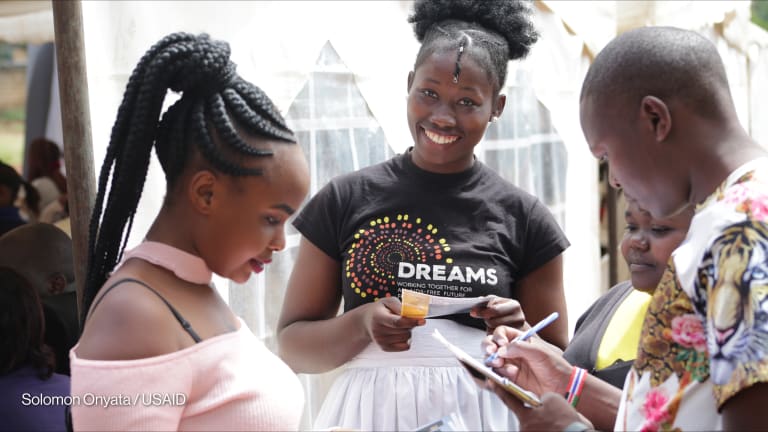Anti-prostitution case threatens localization agenda, experts warn
The U.S. Supreme Court is set to consider whether global health organizations' local affiliates should adopt policies opposing prostitution. The case could undermine the U.S. government's own effort to put more health services in the hands of local organizations, some experts warn.
WASHINGTON — The U.S. Supreme Court is set to consider the latest version of a dispute between the U.S. government and global health organizations over the “anti-prostitution loyalty oath.” This time the judges will determine whether the same First Amendment protections that shield U.S.-based organizations from the policy should also apply to their local affiliates. The case is rooted in a decade-long debate over global health policy, and it has broad implications for how the U.S. government treats local organizations. It could undercut a high-priority push toward localization that U.S. development and global health agencies are currently trying to advance, experts say. “If you are saying the only groups who do not have to adopt a position opposing sex work are U.S.-based organizations, you are saying the only groups who can feel fully untethered by this are U.S.-based groups.” --— Beirne Roose-Snyder, director of public policy, CHANGE “We consistently drop the ball on key populations programming for HIV, because we need to have the work being done by key populations-led organizations who can identify their own needs and their own security needs,” said Beirne Roose-Snyder, director of public policy at CHANGE. “If you are saying the only groups who do not have to adopt a position opposing sex work are U.S.-based organizations, you are saying the only groups who can feel fully untethered by this are U.S.-based groups, and U.S.-based groups are not sex worker-led groups, they’re not the [men who have sex with men]-led groups,” Roose-Snyder said. In 2013, the Supreme Court ruled 6-2 that a government policy from 2003 requiring organizations to denounce prostitution in order to be eligible for U.S. HIV funding violated those organizations’ right to free speech. In his majority opinion, Chief Justice John Roberts wrote that imposing the policy was akin to “compelling a grant recipient to adopt a particular belief as a condition of funding,” which the court found to be unconstitutional. On March 25, the court will hear oral arguments in this latest phase of a decades-long argument. The judges will consider whether the U.S. government can require local affiliates of U.S.-based organizations — which often share their names, logos, branding, and missions, but which are incorporated in the countries where they operate — to adopt anti-prostitution policies. The U.S. government is appealing a 2018 ruling by a lower court, which found that requiring local affiliates to adopt such a policy would violate the free speech of their U.S.-based counterparts. “Respondents maintain that they and their claimed foreign affiliates should be treated as a single entity for purposes of the constitutional analysis. But no support exists for such a constructive merger,” the U.S. government’s legal team argued in their brief. “Legally distinct entities are not treated as one. That remains true even if the organizations share similar names, logos, and brands as respondents assert they and their claimed affiliates do,” they wrote. The case is being brought by the heads of the U.S. Agency for International Development, the Department of Health and Human Services, and the Centers for Disease Control and Prevention — with the Alliance for Open Society International, Pathfinder International, and Save the Children Federation arguing against the government’s position that it can require local affiliates to adopt the APLO. The NGO representatives argue it would be unreasonable to force views onto an organization’s local affiliate that contradict the views of its U.S.-based counterpart: “In addition to common branding, affiliates within a given network share a mission and speak with a single voice about their public-health efforts and common guiding principles,” the respondents argued. “That consistent messaging is critical to respondents because, in practice, the common identity shared with their affiliates creates ‘a two-way street,’” they wrote, arguing that the public does not differentiate between actions and statements made by U.S. NGOs and their local affiliates. Many global health organizations oppose the implementation of an anti-prostitution loyalty oath, because it can inhibit their ability to provide health and social services to sex workers, a key population in the fight against HIV. When the Supreme Court struck down the policy in 2013, Peter Piot, a former director of UNAIDS, called it, “a victory of public health and scientific evidence over ideology and bigotry.” The U.S. President’s Emergency Plan for AIDS Relief has increasingly recognized the importance of providing HIV services to key populations such as sex workers, and this priority is reflected in its latest country program guidance, said Jen Kates, senior vice president and director of global health & HIV policy at the Kaiser Family Foundation. “We can’t end the AIDS epidemic without reaching this population,” Kates said, adding that policies that require organizations to oppose prostitution can have a “deterrent effect” when it comes to those populations choosing to access services. PEPFAR has also set a target of spending 70% of its funding through “indigenous” organizations. Local organizations — including the local affiliates of U.S.-based organizations — are often in the best position to work directly with these key populations, and to allow these populations to set the terms of that engagement, health experts argue. If those organizations are required to adopt a stance opposing prostitution in order to receive those funds, they might not be able to provide services to one of PEPFAR’s key populations. “Letting them set the tone, the time, the location for good programs — even if you take a moralistic view — is still the more efficient way to work,” Roose-Snyder said, describing both the APLO and the “global gag rule,” which prohibits funding to organizations that provide information about abortion, as “huge disincentives to localization.” “We want good results, but we’re creating a system where they can’t be the best results, but the best we can get is still from U.S.-based orgs. I don’t think that’s intentional, but it is certainly prevalent,” she added. USAID Administrator Mark Green, who has been one of the most vocal champions for building “self-reliance” to enable countries to lead their own development efforts, is one of the case’s plaintiffs. In response to an inquiry from Devex, a USAID spokesperson wrote, “USAID does not comment on on-going litigation.” For some advocates of sex workers’ rights, this latest effort by the U.S. government to litigate its case shows that the conversation has moved away from a discussion about the rights people have to access health services and make decisions about their own lives to one about how much control the U.S. government has over organizations that receive its funding. “For those in the development and international NGO community, this is about being able to preserve as much as they can the autonomy of their work,” said Juhu Thukral, vice president at the International Women’s Health Coalition. “Those are very important issues. They need to be protected. But these are not neccessarily stakeholders who are aligned with the cause and the lives of the people who have always been at the heart of this case, and that’s sex workers,” she said.
WASHINGTON — The U.S. Supreme Court is set to consider the latest version of a dispute between the U.S. government and global health organizations over the “anti-prostitution loyalty oath.” This time the judges will determine whether the same First Amendment protections that shield U.S.-based organizations from the policy should also apply to their local affiliates.
The case is rooted in a decade-long debate over global health policy, and it has broad implications for how the U.S. government treats local organizations. It could undercut a high-priority push toward localization that U.S. development and global health agencies are currently trying to advance, experts say.
“We consistently drop the ball on key populations programming for HIV, because we need to have the work being done by key populations-led organizations who can identify their own needs and their own security needs,” said Beirne Roose-Snyder, director of public policy at CHANGE.
This story is forDevex Promembers
Unlock this story now with a 15-day free trial of Devex Pro.
With a Devex Pro subscription you'll get access to deeper analysis and exclusive insights from our reporters and analysts.
Start my free trialRequest a group subscription Printing articles to share with others is a breach of our terms and conditions and copyright policy. Please use the sharing options on the left side of the article. Devex Pro members may share up to 10 articles per month using the Pro share tool ( ).
Michael Igoe is a Senior Reporter with Devex, based in Washington, D.C. He covers U.S. foreign aid, global health, climate change, and development finance. Prior to joining Devex, Michael researched water management and climate change adaptation in post-Soviet Central Asia, where he also wrote for EurasiaNet. Michael earned his bachelor's degree from Bowdoin College, where he majored in Russian, and his master’s degree from the University of Montana, where he studied international conservation and development.








